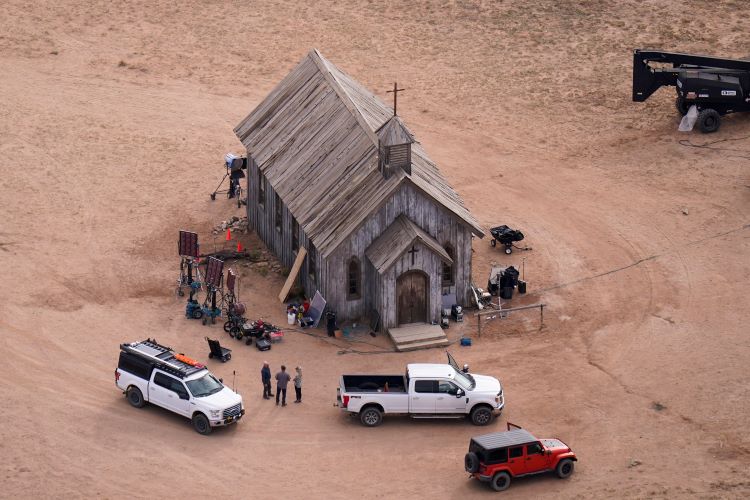[ad_1]
Criminal Justice
Prosecutors blame disclosure of attorney-client texts on ‘cavalier legal representation’ by ‘Rust’ armorer’s lawyer

This aerial photo shows the movie set of Rust at the Bonanza Creek Ranch in Santa Fe, New Mexico, in October 2021. (Photo by Jae C. Hong/The Associated Press)
Updated: A lawyer representing an armorer accused in the movie set shooting death of a cinematographer has failed to win dismissal of charges against his client, despite the disclosure of texts protected by attorney-client privilege.
In a hearing Wednesday, Judge Mary Marlowe Sommer of the First Judicial District in New Mexico refused to toss the case against Rust armorer Hannah Gutierrez-Reed. Sommer said Gutierrez-Reed had signed a consent to search her cellphone that had no limitations, and she was not prejudiced by the disclosure.
Law360 has coverage here and here, while Variety has coverage here and here.
“To reiterate, if you consent to a search, anything of evidentiary value seized in the course of the search can and may be introduced as evidence,” Sommer said during the hearing, according to Law360.
The dispute involves texts between defense lawyer Jason Bowles and his client Gutierrez-Reed, who is charged with involuntary manslaughter in the October 2021 shooting death of cinematographer Halyna Hutchins on the set of the film Rust. Gutierrez-Reed is accused of mistakenly placing a live bullet in the gun used by actor and co-producer Alec Baldwin.
According to Law360, the controversy “raises questions about whether attorneys should text with clients and serves as a cautionary tale for prosecutors and the defense on the importance of protecting privileged communications.”
The texts were disclosed after Gutierrez-Reed signed a boilerplate form consenting to a search of her cellphone by investigators. The messages were disclosed to a witness for the prosecution whose company provided the blank ammunition for the film.
The witness, Seth Kenney, obtained the texts in a public records request made when Gutierrez-Reed blamed him in a lawsuit for supplying the wrong ammunition, according to Law360. The suit has since been dismissed.
The text messages discussed a strategy in which Bowles would argue that Kenney was responsible for the ammunition mix-up, according to Variety. Kenney agreed to destroy the texts at the request of prosecutors, although he did provide the cellphone records to his lawyer, according to Law360.
In a motion filed last month, Bowles said he made clear to the lead investigator that the cellphone search should relate only to Rust-related material and should not include attorney-client communications or private material. Nor did Gutierrez-Reed consent to sharing the data with third parties, Bowles said. According to Bowles, prosecutors should have used a “taint team” to filter out privileged communications.
The Hollywood Reporter called the case-dismissal request a “Hail Mary motion.” Bowles also sought alternative relief, however, including dismissal of the special prosecutors in the case or suppression of the privileged texts.
Special prosecutors Kari Morrissey and Jason Lewis said Bowles is to blame for the disclosure. In a Feb. 2 court filing, they argued that the disclosure was due to “cavalier legal representation” by the defense counsel, who failed to limit the scope of the search in writing.
Gutierrez-Reed is scheduled to go on trial next week, the Associated Press reports. Baldwin is also charged with involuntary manslaughter, but his trial won’t happen until after Gutierrez-Reed is tried.
Law360 discussed the case with Peter Joy, a professor at the Washington University School of Law in St. Louis.
Joy said ethics rules don’t prohibit lawyers from texting clients, but lawyers are expected to take reasonable measures to protect confidential information. He thinks that attorneys should avoid texting privileged or sensitive information because of the potential for disclosure.
“This is a cautionary tale about what not to do when communicating with a client,” Joy told Law360.
Criminal defense lawyer John W. Day of Santa Fe, New Mexico, told Law360 that it’s best to use “old-school stuff” when communicating with clients, meaning talking in person or on the phone.
See also:
“‘Rust’ and a look at criminal liability on movie sets”
Updated Feb. 15 at 8:45 a.m. to report that Judge Mary Marlowe Sommer of the First Judicial District in New Mexico has refused to toss a case against Hannah Gutierrez-Reed.
[ad_2]




